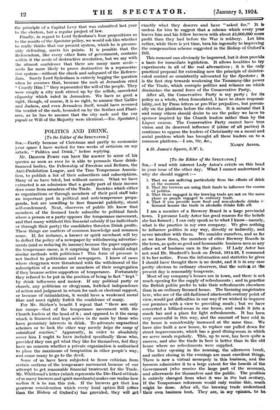POLITICS AND DRINK.
[To the Editor of the SPECTATOR.]
Sia,—Partly because of Christmas and partly to economize your space I have waited for two weeks of criticism on my article, " Politics and Drink," before replying.
Mr. Danvers Power can have the answer to some of his queries as soon as ever he is able to persuade those drink- financed bodies, the Fellowship of Freedom and Reform, the Anti-Prohibition League, and the True Temperance Associa- tion, to publish a list of their subscribers and subscriptions.. Many of us have tried, but without success. What we have extracted is an admission that a goodly part of their income does come from members of the Trade. Societies which either as organizations or through members of their paid staff take an important part in political and anti-temperance propa- ganda, but are unwilling to face financial publicity, stand self-condemned. Next, observers of public life know that members of the licensed trade subscribe to political funds where a person or a party opposes the temperance movement, and that many withhold this financial subsidy if (as individuals or through their party) the candidates threaten Drink profits. These things are matters of common knowledge and common sense. If, for instance, a brewer or spirit merchant will try to deflect the policy of a newspaper by withdrawing advertise- ments (and so reducing its income) because the paper supports the temperance cause, is it surprising that they should adopt similar methods with politicians ? This form of pressure is not limited to politicians and newspapers. I knew of cases where clergymen were threatened with the withdrawal of the subscription of a member or members of their congregation if they became active supporters of temperance. Fortunately they refused to be put in the position of being in fact " kept " by drink influences and money. If any political party or church, any politician or clergyman, forfeited independence of action and judgment in return fer cash or electoral support, or because of intimidation, it would have a weakened moral fibre and must rightly forfeit the confidence of many.
For Mr. Shirlaw's benefit I repeat that " there are only two camps—that of the temperance movement with the Church leaders at the head of it ; and opposed to it the camp which is financed and kept active in the main by those who have pecuniary interests in drink, To advocate Impractical schemes or to look the other way merely helps the camp of subsidized reaction." Apparently, in order to absolutely cover him I ought to have included specifically those who, provided they can get what they like for themselves, feel they have no concern whether a private organization is authorized to place the maximum of temptation in other people's way, and cause many to go to the devil.
Some of us have been subjected to fierce criticism from certain sections of the temperance movement because of our attempt to get reasonable financial treatment for the Trade. Mr. Whitbread's letter (which represents the Die-Hard attitude of so many brewers and spirit merchants) makes one realize how useless it is to run this risk. If the brewers get that less generous consideration which every local option Bill (other than the Bishop of Oxford's) has. provided, they will get exactly what they deserve and have " asked for." It useless for him to suggest that a scheme which every yeas leaves him and his fellow brewers with about £5,000,000 more profit than they had before the War is robbery. Let him rather, while there is yet time, tura his ingenuity to improving the compensation scheme suggested in the Bishop of Oxford's Bill.
This measure can obviously be improved, but it does provide, a basis for immediate legislation. It allows localities to try experiments in all of the real alternatives ; it is the only practical proposal for extending now the principle of disinter- ested control so consistently advocated by the Spectator ; it is the first step towards weakening the Tammany-like power of the Trade, which corrupts politics and reliance on which diminishes the moral force of the Conservative Party.
After all, the Conservative Party is my party ; for its policy as a whole, when formulated, I have to share responsir bility, not by Press letters or pre-War prejudices, but person- ally on the platform before the electors. It is natural that I and many others should desire to see the policy we have te sponsor inspired by the Church leaders rather than by the Liquor caucus. The Conservative Party cannot have true vision and its deserved influence if (alone of all parties) it continues to oppose the leaders of Christianity on a moral and social problem which has brought all these leaders on to a common platform.—I am, Sir, &e., NANov Agron.
4 St. James's Square, S.W. 1.














































 Previous page
Previous page